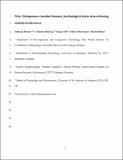Chimpanzees consider humans' psychological states when drawing statistical inferences
Abstract
Great apes have been shown to be intuitive statisticians: they can use proportional information within a population to make intuitive probability judgments about randomly drawn samples [1, J.E., J.C., J.H., E.H., and H.R., unpublished data]. Humans, from early infancy onward, functionally integrate intuitive statistics with other cognitive domains to judge the randomness of an event [2; 3; 4; 5 ; 6]. To date, nothing is known about such cross-domain integration in any nonhuman animal, leaving uncertainty about the origins of human statistical abilities. We investigated whether chimpanzees take into account information about psychological states of experimenters (their biases and visual access) when drawing statistical inferences. We tested 21 sanctuary-living chimpanzees in a previously established paradigm that required subjects to infer which of two mixed populations of preferred and non-preferred food items was more likely to lead to a desired outcome for the subject. In a series of three experiments, we found that chimpanzees chose based on proportional information alone when they had no information about experimenters’ preferences and (to a lesser extent) when experimenters had biases for certain food types but drew blindly. By contrast, when biased experimenters had visual access, subjects ignored statistical information and instead chose based on experimenters’ biases. Lastly, chimpanzees intuitively used a violation of statistical likelihoods as indication for biased sampling. Our results suggest that chimpanzees have a random sampling assumption that can be overridden under the appropriate circumstances and that they are able to use mental state information to judge whether this is necessary. This provides further evidence for a shared statistical inference mechanism in apes and humans.
Citation
Eckert , J , Rakoczy , H , Call , J , Herrmann , E & Hanus , D 2018 , ' Chimpanzees consider humans' psychological states when drawing statistical inferences ' , Current Biology , vol. 28 , no. 12 , e3 , pp. 1959-1963 . https://doi.org/10.1016/j.cub.2018.04.077
Publication
Current Biology
Status
Peer reviewed
ISSN
0960-9822Type
Journal article
Description
This work was supported by a research grant of the German Science Foundation DFG (grant # RA 2155/3-1) to Hannes Rakoczy and Josep Call. Further, we acknowledge support by the Leibniz Association through funding for the Leibniz Science Campus Primate Cognition.Collections
Items in the St Andrews Research Repository are protected by copyright, with all rights reserved, unless otherwise indicated.

